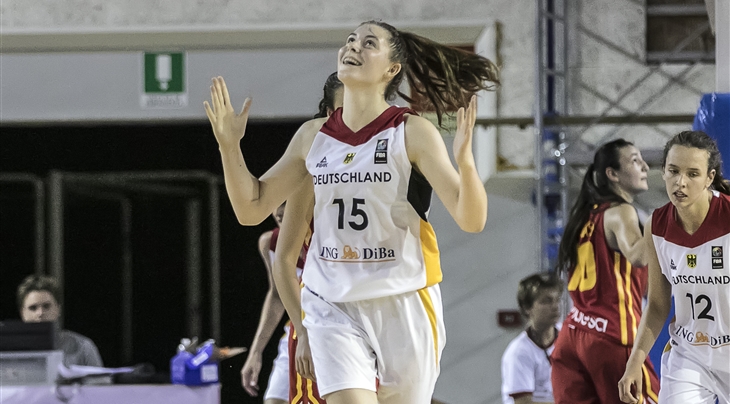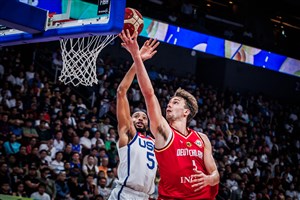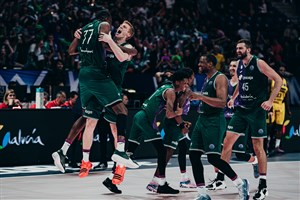
Tide still turning in European youth basketball
NEWCASTLE (Paul Nilsen’s Women’s Basketball Worldwide) – The last event of the international season hasn’t even finished yet, but 2016 has already demonstrated how the tide is continuing to turn within the fascinating world of European women’s youth basketball.
It is something I have written about every year and more than ever, I feel that there is every chance that the traditional domination of powerhouse nations such as Spain, Russia and France could now have a limited shelf-life. Perhaps it might seem a strange thing to say with Spain and France landing the U20 and U18 titles, but bear with me.
These top drawer nations are now acutely aware that the gap is being closed and they must raise their own standards in every single facet of their development and performance programmes if they want to keep their heads above everyone else and remain the juggernauts. It’s actually not about their demise, it’s a positive about other countries closing the gap and the exciting emergence of newer nations who are making everybody else to sit up and take notice.
The shifting sands are seeing the genuine emergence of nations such as Bosnia and Herzegovina who now find themselves heading into 2017 with two of their three age group teams in Division A. It is a remarkable achievement. Sure, they have had a stunning talent in Melisa Brcaninovic to lead them, but they were not a one player team. Nikolina Delic was evidence of that in Matosinhos at the FIBA U20 Women’s European Championship and Nikolina Zubac at U18 level.
 Could Germany be on course for their best ever result at the FIBA U16 Women's European Championship?
Could Germany be on course for their best ever result at the FIBA U16 Women's European Championship?
Meanwhile Germany have been a ‘yo-yo’ nation moving between Divisions and perhaps spending a larger share of life in the second tier. At the FIBA U16 Women’s European Championship in Udine, one glance at them in the warm-up before their first game and you couldn’t help but feel excited. Just over 24 hours later they were coming back from 10 points behind to shut down Spain 53-40 in an incredible result. The long-term question for Germany is whether they can be bold in their philosophy and mentality to establish themselves at the top level consistently. They will have to have some flexibility and courage in letting the occasionally overly gifted player to express themselves.
Belarus were promoted last year from FIBA U16 Women’s European Championship Division B and opened up their campaign in Udine with a special performance to blast away Serbia. They have a very special player in Kseniya Malashka who was at the FIBA Women’s Olympic Qualifying Tournament in Nantes earlier this summer. Whether they survive in coming days will have to be seen but such results are a wake-up call to anyone who is caught sleeping at these tournaments which are more competitive and cut throat than ever.
Drop down into Division B and there have been some other eye-catching numbers, with Luxembourg sat 4-0 at the time of writing in Oradea at the FIBA U16 Women’s European Championship Division B.
 Could a so-called 'minnow' like Luxembourg be edging towards Division A status?
Could a so-called 'minnow' like Luxembourg be edging towards Division A status?
Plus, all of this comes off the back of 2015 when Czech Republic won their first title at U16 level, Portugal made their first Final, Latvia qualified for a first ever global spot at youth level. The examples are plentiful.
It’s all becoming more unpredictable and challenging than ever, because of the somewhat controversial Division A relegation system. Everything relies effectively on one result during the Round of 16; this ‘fork in the road’ means your medal chances are either potentially blown in 40 minutes if you are a powerhouse nation or you can rejoice saving your Division A status in just 40 minutes if you are an underdog – no matter how abject you play in as many as the other eight games. It has become primarily about avoiding the Round of 16 cliff edge which is a pity.
All of this gives those tasked with overseeing Federation youth programmes much to chew over and then digest. There is also the fact that every nation is at the mercy of a so-called ‘poor generation’ coming along. With the added Round of 16 issue in play alongside ever more capable underdogs in tournaments, even the very best nations will have to be more mindful than ever of not only missing out on the podium, but having to endure the indignity of being sucked into a relegation battle.
It’s endlessly intriguing and as the action unfolds at Rio 2016 – I haven’t even strayed into the joy of searching out potential future Olympians at these events, especially U16 level and how much of a pleasure it is to see such players take their first international footsteps.
FIBA
FIBA's columnists write on a wide range of topics relating to basketball that are of interest to them. The opinions they express are their own and in no way reflect those of FIBA.
FIBA takes no responsibility and gives no guarantees, warranties or representations, implied or otherwise, for the content or accuracy of the content and opinion expressed in the above article.
















